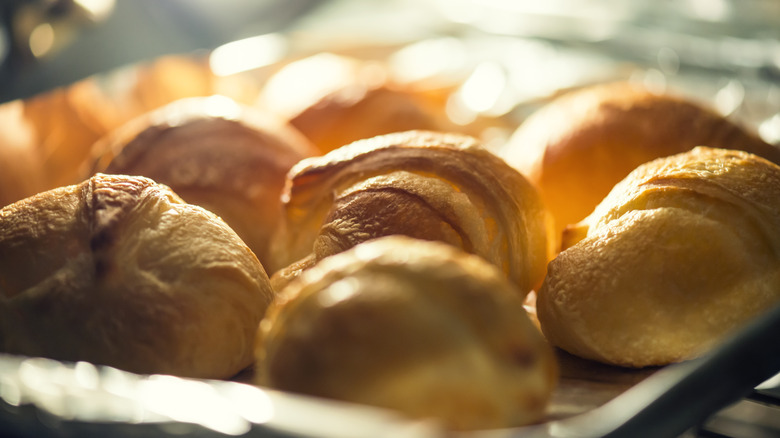The Water-To-Flour Ratio For Baking Bread With The Yudane Method
For those who don't bake bread often, it can be an incredibly intimidating task. The wrong room temperature, some old yeast, or even forgetting about your dough for a minute, could ruin hours — even days — of work. There are a lot of fool-proof bread-baking tips to help ensure you pull a perfectly crusted, mouth-watering loaf out of the oven. The yudane method, which roughly translates to the "water roux" method in Japanese, focuses more on texture, producing soft, roll-like loaves of weightless bread.
The yudane method is very easy to do, and while it can work for many bread recipes, we recommend using it when you're looking to bake fluffy bread like dinner rolls or challah. It typically calls for a 1:1 ratio of flour to (an equally weighted amount) of boiling water. However, some recipes require more water than flour; for those, you can mix the boiling water with about 20% of the flour before adding it to the rest of the ingredients including the remaining flour. Please note, you only want to mix the flour with the boiling water, not yeast or any other ingredients — which you'd run the risk of burning. Then, once your boiling water-flour mixture has cooled, you can add it to the rest of your ingredients.
How does the yudane method work?
The yudane method first originated in Japan, home of "Shokupan," the cloud-like milk bread. To get such airy and pillow-like loaves, you need to infuse a lot of moisture into the flour. However, as anyone who has over-watered their dough can attest, soggy dough is impossibly sticky to work with. The yudane method allows you to wake up your starch by adding moisture without ending up with a gunky, unworkable mess stuck to your bowl (plus hands, tools, walls, and countertops).
By boiling your water and mixing it with your flour, you'll gelatinize the starch, which will coagulate around the water molecules, trapping the moisture inside dough pockets. This type of dough is a lot easier to work with and allows for that locked-in moisture to gradually release during the baking process, producing a golden loaf of soft, fluffy delicate bread. Another great perk to using the yudane method is that if you're strapped for time, you can pre-make your roux mixture, throwing it in the fridge overnight, before incorporating it with the rest of the ingredients in your recipe. Give this method a try with our milk bread recipe, you won't regret it!

